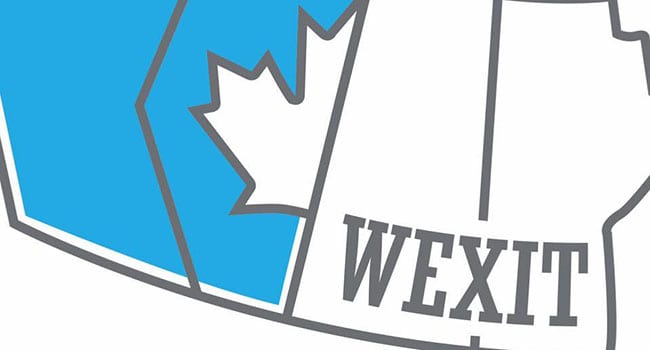By Colin Alexander
Research associate
Frontier Centre for Public Policy
Canada’s recent federal election result exposes intractable challenges dating from Confederation in 1867.
Wexit could allow Alberta to escape from a burden somewhat resembling the maladministration that afflicted Argentina, once one of the world’s richest countries. For the past half century, Canada has not been served well by politicized Robin Hood distortions, with transfers from rich provinces perpetuating the dependency of ones receiving handouts.
How could Quebec possibly be a have-not province, with its established manufacturing industries, its wealth of natural resources and the electricity it gets almost for nothing from Labrador?
Why don’t New Brunswick and Quebec have an active oil exploration industry? Is the St. Lawrence River’s sedimentary basin the world’s only one that doesn’t have huge oil reserves?
The unexploited potential is well known. But the federal government would use any resulting benefits to reduce equalization payments. The Montreal Economic Institute calls this Quebec’s poverty trap, meaning there’s no point in replacing free money by having to work for it. It’s cash-flow-positive and they think it’s environmentally godly to import oil from the United States, Saudi Arabia and even landlocked Kazakhstan, instead of having a pipeline from the West.
At unsustainable cost, the excesses of the welfare state have also had the unconscionable effect of perpetuating a burgeoning underclass of multigenerational welfare recipients, unemployed and all but unemployable. The number of marginalized Canadians is doubling every 20 years. And they’re by no means only Indigenous people living in remote settlements and urban slums, with their terrible rates of suicide and murder, and of violent crime and corresponding incarceration.
Overbearing regulation and the hobbling of natural resource development, especially the development of the petroleum industry, has meant that money to move the country forward simply isn’t there. Every reasonable and informed Canadian understands the connection between the environment and the economy.
“That,” said Environment Minister Catherine McKenna, “is why we are investing $20 billion in public transit and over $20 billion in green infrastructure.”
One obvious challenge is the need for $40 billion to build a world-class transit system in Toronto. That’s twice the allocation for public transit that McKenna boasted of for the entire country. Public transit in Toronto would take cars off the road, improve the quality of life and reinforce the city’s international competitiveness.
Canada’s non-residential business investment, the seed money for wealth creation, is running at -3 per cent year on year. For comparison, it’s been running at +7 per cent in the United States. Forgone revenue from Alberta’s oil industry has been $80 million daily, along with some $100 billion in capital investment forgone. Unlike government spending, natural resource industries have an exponential multiplier effect across the entire country.
The challenges of today were foreseen early on. When working on a new constitution for South Africa in 1908, Sir Henry de Villiers sent a delegation to find out about what Canada achieved in 1867. They received advice from a father of Confederation from Prince Edward Island, William Henry Pope. Understanding the potential for irreconcilable conflicts, he recommended that South Africa should under no circumstances follow Canada’s example of establishing a federal state. That’s why they got the Union of South Africa.
It’s inconceivable that Canada’s eastern and central provinces would willingly rebalance representation in the two chambers of Parliament or in the Supreme Court. It’s also inconceivable that negotiations would ever end equalization payments or the control of natural resources that the federal government has constantly abused. With Quebec’s tail wagging the national dog, Westerners know that francophones dominate their prospects for employment in the federal civil service, and especially for promotion to senior positions, as well as for national policy development. These bedrock issues are intractable.
The Supreme Court has required negotiation of Quebec’s terms of separation, if it came to that. Since, however, neither the federal government nor the central provinces are to be trusted to negotiate in good faith, Alberta and maybe one or more Western provinces and territories should simply declare independence unilaterally, should there be a referendum with a substantial majority favouring separation.
There are plenty of examples of the successful transfer of powers to a new country. In modern history, several countries have split up without the nonsense of Brexit. Norway separated from Sweden in 1905. The Irish Republic separated from Britain in 1922. The Austro-Hungarian Empire split into many parts in 1919. Slovakia separated from Czechoslovakia in 1993. And there are only a few examples of the turmoil arising from the dismemberment of the former Yugoslavia.
With newfound petty cash, independent Alberta could bring its defence spending up to what U.S. President Donald Trump has been expecting of NATO members, and not getting from Canada. It could then expect to find Washington far more helpful in getting oil to market, and in developing natural resources, than Ottawa and central Canada would ever be.
The remaining provinces would also benefit from being weaned off unearned transfers from the West. The effect of paying provinces, and by extension people, not to work is both debilitating and humiliating, and Wexit could go a long way toward solving that problem.
Colin Alexander is a research associate for Frontier Centre for Public Policy and former publisher of the Yellowknife News of the North. Colin is an author of a number of books published by McGraw-Hill.
Colin is a Troy Media Thought Leader. Why aren’t you?
The views, opinions and positions expressed by columnists and contributors are the author’s alone. They do not inherently or expressly reflect the views, opinions and/or positions of our publication.
